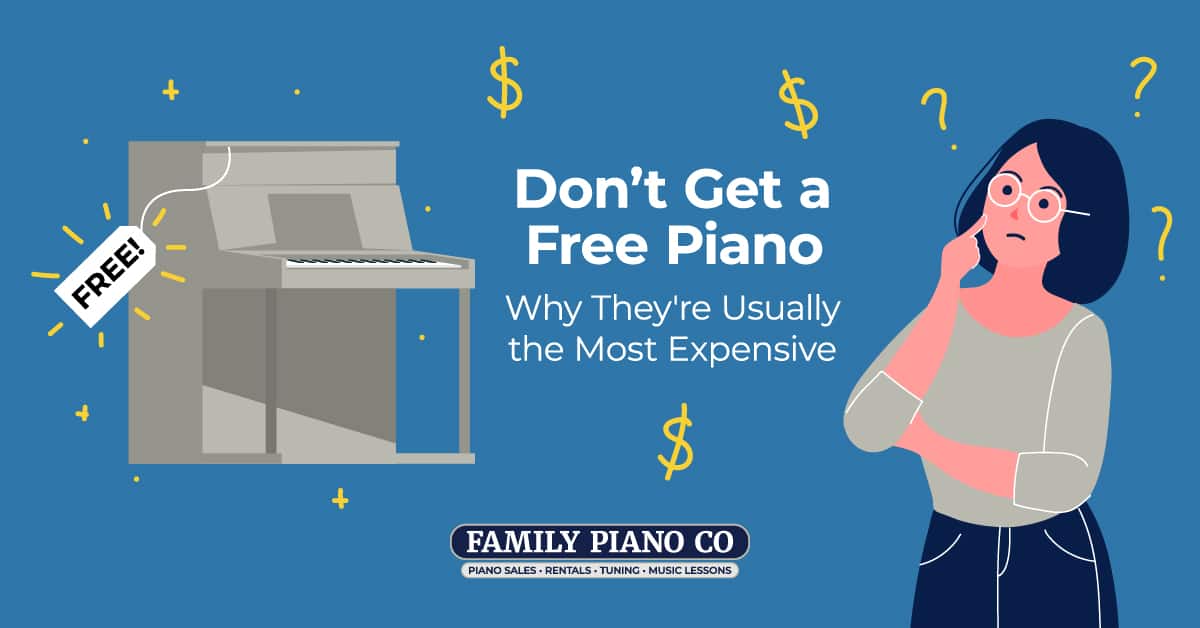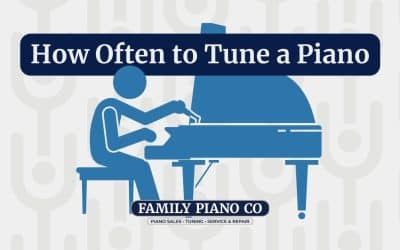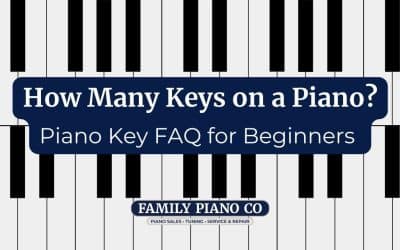You can find many free pianos on Craigslist or Facebook Marketplace.
And at first, the idea of finding a nice-looking “free” piano, rounding up a few friends to lift it into a truck to take it home seems tempting.
The reality though is that going for a “free” piano runs a very high risk of ending up with a bad piano that requires costly repairs.
Even worse, you could end up with an unrepairable, untunable piano that you’ll need to dispose of yourself.
Pitfalls of “Shopping” Free Pianos
The basic process of picking a free piano is browsing a few dozen listings near you, finding one that looks good, and messaging the owner to arrange a pickup.
The process sounds simple enough, and its initial ease may make the free piano seem like the right decision.
However, there’s quite a bit more to the process than first meets the eye.
Lack of Information on Piano
One of the largest initial obstacles to finding a good free piano is the lack of useful information on most of the free piano listings. A large number of them:
- Only have a few—usually low-quality—images.
- Don’t mention the brand, model, or any size dimensions.
- Don’t state the serial number—which tells you the piano’s age and country of manufacture.
- Don’t have any pictures of the inside—hammers, strings, action parts—which give a good idea of the current condition of the piano.
- Lack any description of the piano’s tone or feel—or other useful information that might justify the effort of getting the piano!
Without most of this useful information, you’re left in the dark as to which pianos might actually be worth the effort to consider seriously.
Lack of Knowledge from Sellers
Asking the poster for additional information can sometimes be fruitful in light of the lack of piano information.
But the vast majority of people giving away free pianos know very little about pianos.
This may seem like a no-brainer, but this mean they likely can’t tell you exactly how the piano plays, feels, and sounds; — or even its actual condition!
They may have some additional information and might be willing to send you more pictures, but oftentimes this runs into a second problem.
Lack of Patience from Sellers
Most posters are impatient and just want the piano gone as soon as possible.
Many will feel that since they’re offering their piano for free, they shouldn’t have to “work” with you as much. Some people will frankly have little patience for any questions.
One of the most common phrases you’ll find on free piano posts is some iteration of “must go ASAP”.
This puts a ton of pressure on you to immediately come out to see the piano. And they’ll assume since you came out, you’ll pick it up immediately right then and there.
This all makes professional involvement like a qualified piano move or a visit with a piano technician more difficult too.
Possible Scams
In addition to these difficulties, you’ll have to sort through posts that aren’t actually in your area, that are old and unavailable, and that are scams.
Often these scams are free piano posts that seem a bit too good to be true. That ” free shiny black Yamaha baby grand” could lead to you paying for a fake move or giving up your personal information!
Read our post on how to avoid piano scams!
Taking in a Free Piano the Right Way
If a piano is being given away for free, it’s because it has no value to the owner.
It’s reasonable to assume that if the owner doesn’t value the instrument, it’s probably an older piano that hasn’t been properly taken care of.
So it is highly likely a “free” piano will require $1,000+ worth of work to play at an acceptable level (assuming the piano is even in a repairable state).
And even with this work completed, there remains a high probability of expensive future repairs as the piano acclimates as well.
Note: these costs are general estimates and will vary depending on your local market!
Get the Piano Moved
Your best option is paying for a professional move, costing approximately $200–$300.
While you may be considering picking up the piano yourself, this runs a high risk of injury to yourself, your friends, and the piano.
Most free pianos are in a fragile state and an unprofessional move can easily cause more damage in repairs than the cost of a professional move.
Schedule a Piano Tuning (or 2-4)
Your “free” piano most likely has not been regularly tuned in a long time.
Assuming it is still capable of holding a tune (which you would not know until a technician has looked at it), you’re not just looking at a single standard tuning.
A standard tuning from one of our techs costs $135 with a pitch raise for very out-of-tune pianos bringing it up to $195.
An older upright that has not seen regular tuning in years and has just been moved into a new home could easily require 2-4 tunings in just the first year to regain the ability to hold its tune.
So getting a free piano in-tune could cost around $150 to $500 depending on local tuning rates.
Consider a Piano Cleaning
It would be fair to say many free pianos haven’t been worked on internally for many, many years. Additionally, the piano could have been negatively affected by pets or smoking during its life.
Dust, dirt and grime are bad news for the 12,000 parts in a piano. It impacts the sound, playability, and is a good indicator of the overall condition of the internal parts.
Another worry is the potential of pest infestation being brought into your home from your free piano!
A thorough cleaning of the inside and outside of the piano by a skilled technician is recommended, which can cost around $100–$300.
Get the Piano Repaired & Regulated
Your “free” piano will almost certainly be in need of regulation, essentially re-aligning those 12,000 mostly wooden parts in order to play consistently.
There’s a good chance several parts will need to be replaced. Depending on what needs to be replaced or repaired, these costs could easily stretch from $100s to $1000s if substantial parts replacements are required.
Don’t Count on a Great Free Piano
Again, most free pianos are going to be older and lower-quality instruments that weren’t well-maintained.
This makes sense since higher-quality instruments would retain their value, and they wouldn’t be likely to be given away for free.
So even with all this work done, you could still be left with a not-great piano that’s likely to break down again.
Its true sound, feel, and quirks will not be apparent until after you’ve spent significant time playing on it either!
This is not to say that a “free” piano is never worth it, but your odds of finding a truly worthwhile “free” piano are slim — much like finding a needle in a haystack.
Free Pianos: A Final Verdict
A piano is a large and complicated instrument that requires proper care to play properly.
For most, the decision to get a piano is a decision you’ll only make once in your lifetime. So for all the effort that goes into getting a piano, you should hope it sounds, plays, and looks good.
In searching for a free piano, your choices are limited to mostly older, subpar instruments that have little musical or financial value. Plus you’ll likely be spending a lot just to get that little musical value to show up!
And really, there’s no telling what you’re really bringing home without the expertise of a professional technician.
Yes, it is possible to find a decent or even nice free piano to take home. Usually if a friend or family member is giving it away, you can at least get an honest and patient look at the instrument.
However, even if you avoid expensive repairs, you should still expect tuning, moving, and general maintenance costs!
If a free piano is the only piano you can afford at the moment, do a lot of research on how to buy a piano. And get a technician involved too! This’ll make you less likely to take in a lemon or fall for a scam.
And finally, always remember: a free piano is never actually free.





I was a victim of piano scam .. I am a teacher and i got the email about a widower downsizing late husbands grand piano and introduced me to a moving company , which i paid $800 and got nothing for months after the delivery date passed ..
): So sorry to hear! We’re actually writing another post soon about a similar scam. Many of us have been getting it emailed, and we definitely don’t want anyone else to fall for it!
Sorry to hear that. The same thing ALMOST happened to me a week ago. Same basic story. They tried to get me to pay via VENMO ahead of time, and when I said it was a congregation, and that we would have a check cut for them and presented upon delivery, they balked. So they sent me a very short, grainy video of a piano that was already disassembled and packed up, so I could not really see it well. Even then, when I said I had been recently almost scammed and that I would be happy to come out to where he was at to, pay half then at his location, then drive with him to our congregation and pay him the remainder, he first chuckled saying I could do that if I really wanted, but that made me worried I’d never come back alive. When I expressed again my reservations, the “mover” started giving some dramatic story about being God-fearing and would never imagine doing something like that. What smelled a tad bit fishy at the start was becoming a full on putrid stench.
Glad you were able to see through the nonsense! Paying via Venmo or other uninsured payment methods is one of the red flags we point out!
We recently posted an article highlighting free piano scams, and it has other tips in there. We hope it helps you recognize fishy behavior in the future should anyone try to get one off on you again.
Thanks for sharing your experience! And you’re a good writer, by the way. Love that last sentence.
I got a free piano. 71 st birthday. Cost 435$ to get it to my house. Then $135 for a tuning. Tuner recommended a humidifier, ($100) because it had a couple sticky keys. I paid $800 for an online piano course that I loved. (Scott Houston) I learned to play quite a bit within the first 6 mo. THEN WE HAD A VERY-WET RAINY spring; and humidifier no longer needed, no more sticky keys! I LOVE LEARNING to play at 72! THEN we were moving. ARGHHH! I’m not even DONE with my piano course, so I practice as much as I can while cleaning n packing. We decide to NOT take (move) piano, find a home, find helpers, pay them ($150) to load into my horsetrailer (very low and had convenience of a ramp) THEN it snows that day 🫤and upon returning home (empty) truck n trailer spin out on ice two houses before home😱Horse trailer (an essential tool back n forth to AZ storage unit from CO)… is totalled…. Truck seriously damaged both steering AND cosmetic, when a good Sam try s n trys to pull it outa ditch, it did come out, but steering now wonky, then truck is “accidentally” taken (StateFarms idea) to a salvage yard/auction lot, “Clerical error” ya right.. We were so lucky to get it back.!!!State farm IS paying (cept the $1000 deductible) So the piano cost us in the end, thousands and thousands$ 🥵Now I’m in my new home in Arizona City looking for another FREE piano…. Damn.
Sheesh, what a story, Laurie! Sorry for all that inconvenience. Choosing to move the piano yourself can be a can of worms, as can a free piano itself. Glad you were able to make it happen and get to playing at any rate! I might suggest you look into a piano rental or digital piano instead of a free piano this time. But I am glad you’re clever enough to get a technician involved! A humidifier is a great idea in dry Arizona climate! Happy playing from all of us in Chicago! (: